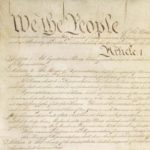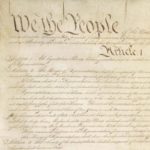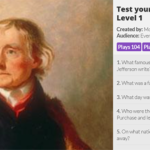Most Americans are unaware about when and where Fourth Amendment rights are at issue. This lesson will allow students to examine the text and interpretations of the Fourth Amendment to describe key terms and ideas like searches, seizures, and privacy, as well as define some of the key debates about where the Fourth Amendment is headed in an age of technology.
Virtual Field Trips at Monticello

Monticello has partnered with Microsoft Skype in the classroom to bring FREE virtual field trips to your students, grades K-12. The virtual field trip lasts about 45 minutes, during which time a Monticello educator will talk to your class about Monticello using images, props, and an online virtual tour. Your students can ask the educator questions, and you can prepare your students with pre- and post-visit resources.
Music Distribution and Copyright
This guided discussion will help students understand copyright law, especially its relevance in this technology-based era. It begins by probing students’ experiences with online media, and eliciting their understanding of copyright. The formal definition can then be presented. A hypothetical copyright conflict between the Jims Brothers and the FrontStreet Boys will illustrate the complexity of copyright law in this technological era.
Is This Story Share-Worthy? Flowchart
E.S.C.A.P.E. Junk News
Kahoot Quizzes on Thomas Jefferson and Monticello
Constitution of the United States

The original U.S. Constitution is on permanent display at the National Archives in Washington, DC. Drafted in 1787 after a hard-won victory in the War for Independence, this document codified the spirit of the Revolution into an ingenious practical scheme of government to promote the welfare of all its citizens.
Teaching Six Big Ideas in the Constitution

This lesson engages students in a study of the Constitution to learn the significance of “Six Big Ideas” contained in it. Students analyze the text of the Constitution in a variety of ways, examine primary sources to identify their relationship to its central ideas, and debate the core constitutional principles as they relate to today’s political issues. (Duration: 45-minute segments, up to 4.5 hours.)
Civil Rights: Identifying Community Issues
MGM v. Grokster (2005)
Can technology producers who promote infringing on copyrights be sued for inducing infringement committed by their users? This case summary shows how the Supreme Court answered that question in 2005.



